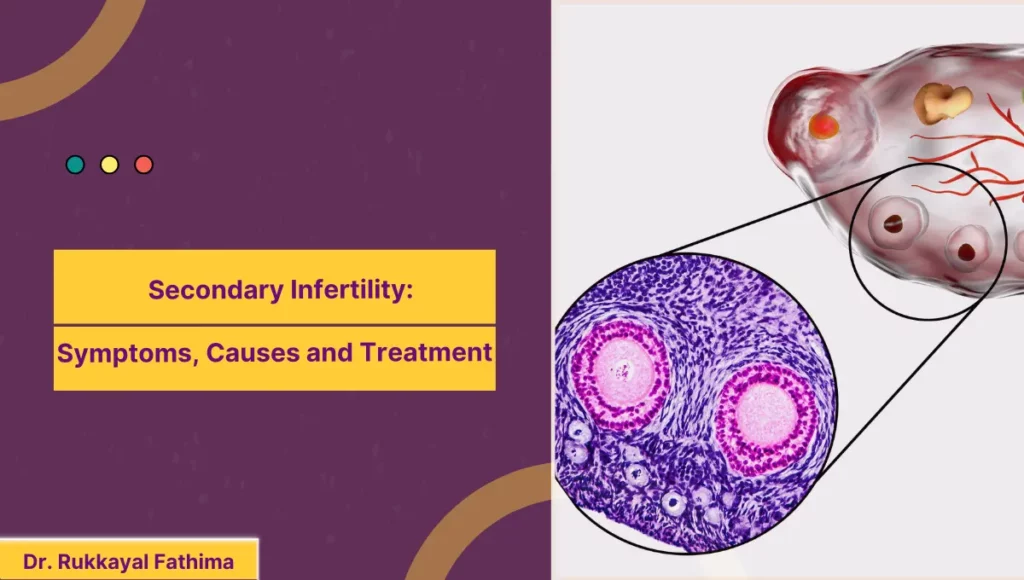Most couples nowadays prefer to have two or more kids. They might think that conceiving a second or third child is easy because they have already given birth to a child. But that is not always the case.
Sometimes, infertility can affect couples or individuals who have already given birth to one or two kids. This condition is called secondary infertility.
Secondary infertility can be a shock to many couples who have given birth previously without any infertility issues. Fortunately, it is easy to rectify, and there are many fertility treatments that are available for patients with this condition.
What is secondary infertility?
Generally, there are two types of infertility, primary and secondary infertility. Primary infertility is where individuals or couples who have never given birth are unable to conceive. These people have trouble conceiving their first child.
Secondary infertility is when an individual or couple who have previously given birth naturally has trouble conceiving again.
This is a common problem for most couples and can affect both men and women. In some cases of secondary infertility, the couple may succeed in conceiving the child but are unable to carry them.
What are the symptoms of secondary infertility?
When it comes to secondary infertility, the main giveaway is the patient’s inability to conceive or carry a baby after a prior successful natural pregnancy.
Secondary infertility can be caused due to various reasons, and the symptoms are often related to its cause.
Suppose a couple who are under age 35 are unable to conceive after regular, unprotected sex, or couples over 35 who have been trying for 6 months but failed to conceive. In that case, they can be affected by secondary infertility.
Secondary infertility is more common in women who are older than 30 and have experienced painful periods, pelvic inflammatory diseases, irregular menstrual cycles, and miscarriages. For men, the main symptom is low sperm count.
What are the causes of secondary infertility?
Secondary infertility can be caused due to infertility problems in either or both partners. It is as common as primary infertility and can be caused due to various factors like,
- Age,
- Complications in previous pregnancies,
- Obesity,
- Unhealthy lifestyle,
- STIs (Sexually transmitted Infections),
- Medications,
- Insufficient sperm production, and
- Alcohol & smoking.
What are the causes of secondary infertility in women?
Some possible factors that can cause secondary infertility in women are given below.
Age: The quality of the eggs highly depends upon the age and health of the female. As a woman ages, the quality of the eggs deteriorates, and they may have chromosomal problems.
Problems in the fallopian tubes: Any blockage or damage in the fallopian tube can cause infertility.
Problems with the uterus: Any damage or scarring in the uterus that can be caused due to prior surgeries like D&C (Dilation & Curettage) or Cesaerean delivery can create adhesions that can affect future pregnancies.
Endometriosis: Endometriosis is a situation where the tissues lining the inner layer of the uterus grow outside the uterus, i.e., on the ovaries or bowel surfaces.
PCOS (Polycystic Ovary Syndrome): PCOS is a hormonal disorder that causes irregular menstrual cycles in women. It affects the ovulation cycle and the production of eggs in the ovaries.
Breastfeeding: Breastfeeding can stop a woman’s body from ovulating and produce eggs for potential fertilization.
What are the causes of secondary infertility in men?
Below are some of the possible causes of secondary infertility in men.
Age: Testosterone levels play a major role in the production of sperm. Aging can affect the levels of testosterone produced.
Poor quality sperm: The quality of the sperm declines as a person ages. Abnormal sperm count, motility, and shape can affect fertility.
Prostate enlargement: Prostate enlargement can affect normal ejaculation and hinder sperm count.
Prostate removal: This condition is caused due to cancer or other health conditions. It can cause semen to flow backward (retrograde ejaculation).
Certain drugs can affect sperm quality: Certain drugs used to treat conditions like high blood pressure can affect sperm quality.
What are treatment options for secondary infertility?
Secondary infertility is an unwelcome visitor that can affect anyone. But it is not untreatable. There are some treatments that can be done to rectify secondary fertility in couples.
Medication

Hormonal medications such as Clomid or Letrozole can be administered to women to induce ovulation.
Drugs like anti-ageing supplements and antioxidants can increase fertility in men, and drug treatments can also increase the quality of sperm.
Surgery

Surgery can be done for both men and women. In men, surgery can be done to treat varicocele and hydrocele, prior vasectomy and repair vas deferens.
For women, surgeries can be done to repair problems like uterine polyps, fibroids and open blocked fallopian tubes.
Assisted Reproductive Technology (ART):
Assisted Reproductive Technology is where eggs and sperm are retrieved, and fertilization occurs in a laboratory under artificial conditions. Artificial reproductive treatments like IVF, ICSI, and IUI come under ART. Couples who have problems conceiving can opt for any of these fertility treatments.
In Vitro fertilisation (IVF)

IVF is where sperm and egg are collected and fertilised in a laboratory. The fertilised embryos are then transferred back into the uterus for further development.
Intracytoplasmic Sperm Injection (ICSI)

ICSI is a type of IVF where instead of placing the eggs among many sperm, a single, healthy sperm is injected into the cytoplasm of the egg.
Intrauterine Insemination (IUI)

In IUI, fertilisation happens within the female reproductive system. Sperm is collected and placed directly into the uterus using a long, thin tube.
Conclusion
Secondary infertility can be a surprising factor for many couples who had no problems conceiving their first child. Even though they already have a child, not being able to conceive another child can be stressful for many. These couples can consult a fertility specialist and find the causes and adequate treatment for secondary infertility.
Frequently Asked Questions
There are some tests that can be done on a female to diagnose the cause of infertility. Given below are some of the tests that are done on a woman.
- Ovulation testing
- HSG (Hysterosalpingography)
- Ultrasound
- Endoscopy (laparoscopy & hysteroscopy
- Pelvic exam & Pap smear
Below are some tests that can be done on a male to diagnose the cause of infertility.
- Sperm analysis
- Specialised Sperm Function Tests
- DNA Fragmentation Tests (DFI)
Environmental and health factors play an important role in infertility. Here are some of the measures you can take to prevent infertility.
- Eat a balanced, healthy diet
- Maintain a healthy weight
- Do regular exercises
- Reduce alcohol, smoking, and drugs
- Treat STIs (Sexually Transmitted Infections) if you have any
Infertility is a big issue affecting millions of people of reproductive age worldwide. According to World Health Organization (WHO), almost 186 million individuals and 48 million couples have fertility problems globally.
Women have the best chance of getting pregnant in their 20s. This is the age when their body will produce a large number of healthy eggs.





